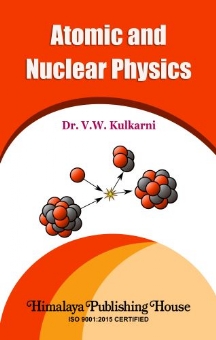Atomic and Nuclear Physics
no information available
The present book is an outcome of long experience of teaching to undergraduate students over about 3 and 1/2 decades. A need was felt for a Textbook of Modern Physics covering the fundamental concepts of Quantum Mehanics, Statistical Physics, Solid State Physics, Atomic and Molecular Spectra, Cosmic Rays and Particle Physics in one single volume. This is what motivated the Author to write the present Book covering all these aspects. The Author hopes that the person Textbook will satisfy the needs of B.Sc. and Engineering students of almost all Indian Universities. Every effort has been made to present the basic concepts with simplicity and clerity so that the students can have the maximum comprehension of the topics. The wide range of topics contains more material than is included in the usual Textbooks. Attempts have been made to strike a balance between theory and practical applications. For those students who are desirous of learning something about advance topics, some topics such as, Raman Effect, Zeeman Effect, Superconductivity, Mossbauer Effect, Luminescemce, Nuclear Magnetic Resonance, Particle Physics, etc., have been introduced. The topics have been arranged in a logical sequence. The Theory of Relativity has been introduced in the initial stage of the Book. The present day description of most of the physical phenomena requires the use of Quantum Theory. With the development of Quantum Electrodynamics enormous progress has been made in understanding the physical world and the structure of matter. The fundamental concepts of Quantum Mechanics have therefore been introduced in two chapters which would help the students in better understanding of the physical phenomena. The fundamental concepts of Statistical Physics have been discussed in a separate chapter. This is followed by chapters on Crystal Structure and Solid State Physics. Two separate chapters have been devoted to the Detectors of Nuclear Particles and Praticle Accelerators. Chapters 17 to 20 deal with the Nucleus, Nuclear Disintegration and Nuclear Fission. The last chapter on Cosmic Rays includes the Elementary Particle Physics. The sample problems with step-by-step solutions are used to illustrate the important quantitative relationship and to increase the understanding of the basic principles. The questions at the end of each chapter are generally graded and divided into Group A and Group B. The questions in Group A are for drill exercise. The questions in Group B are aimed at descriptive answers. A large number of problems are given to test the understanding of the basic principles and some of them are challenging. Contents - 1. Charge and Mass of Electron and Positive Ions 2. Theory of Relativity 3. Quantum Theory 4. Atomic Models and Atomic Spectra 5. X-Rays 6. Natural Radioactivity 7. Matter Waves 8. Fundamentals of Quantum Mechanics 9. Hydrogen Atom 10. Atomic Spectra 11. Molecular Spectra 12. Statistical Physics 13. Crystal Structure 14. Solid State Physics 15. Detectors of Nuclear Radiations 16. Accelerator of Charged Particles 17. Radioactive Decay 18. Atomic Disintegration 19. The Nucleus 20. Nuclear Fission and Fusion 21. Cosmic Rays and Particle Physics ... Read more Read less











